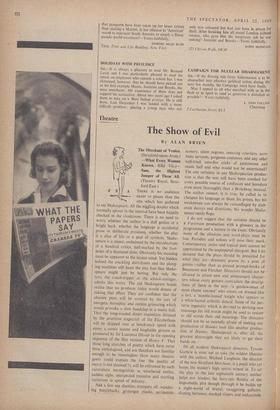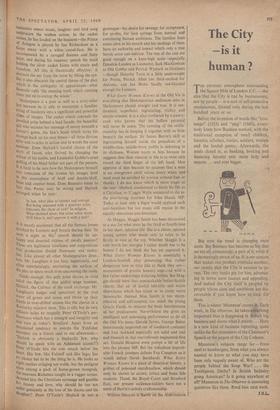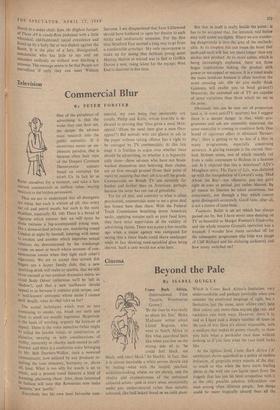Theatre
The Show of Evil
BRIEN By ALAN The Merchant of Venice.
(Stratford-upon-Avon.) —What Every Woman Knows. (Old Vic.)— Sam, the Highest Jumper of Them All. (Theatre Royal, Strat- ford East.) C THERE is no audience easier to please than the one which has gathered to see Shakespeare. All the niggling doubts which normally sprout in the interval have been happily checked in the cloakroom. There is no need to worry whether the author is a dull genius or a bright hack, whether the language is accidental prose or deliberate prosiness, whether the play is a slice of life or a peal of symbols. Shake- speare is a classic, embalmed by the introductions of a hundred critics, hall-marked by the foot- notes of a thousand dons. Obviously his meaning must be apparent to the laziest mind. Yet hidden behind the crackling shirt-fronts and the plung-, ing necklines still beats the tiny fear that Shake- speare might just be boring. But only the tyro, the coach-tripper or the school-outinger, admits this worry. The old Shakespeare hands realise that no producer today would dream of risking that effect. They are confident that the obscure puns will be covered by the sort of energetic horseplay and outsize grimacing which would provoke a slow handclap in a music hall. That the long-winded direct exposition dictated by the primitive stagecraft of the Elizabethans will be skipped over at break-neck speed with many a comic accent and laughable gesture as pioneered by Sir Laurence Olivi6r in the opening sequence of the film version of Henry V. That those long stretches of poetry which have never been anthologised, and are therefore not familiar enough to be meaningless (how many theatre- goers could explain the line 'the quality of mercy is not strained'?), will be enlivened by such naturalistic incongruities as smothered smiles, sudden sighs, unexpected tremulos and startling variations in speed of delivery.
Add a few sea shanties, trumpets off, wander- ing hunchbacks. grotesque masks. peripatetic scenery, silent negroes, sneezing courtiers, acro- batic servants, gorgeous costumes, and any other well-tried, sure-fire tricks of pantomime and music hall and who would not be entertained? The one certainty in any Shakespearian produc- tion is that the text will have been combed for every possible source of confusion and boredom even more thoroughly than a Broadway musical. The author cannot, it is true, be called in to cheapen his language or blunt his points, but his weaknesses can always be camouflaged by elab- orate decoys and diversions. No wonder. Shake- speare rarely flops.
1 do not suggest that the antidote should be a Variorum production with a glossary in the programme and a lecture in the foyer. Obviously many of the allusions and word-plays must be lost. Parodies and echoes will miss their mark. Contemporary satire and topical jests cannot be appreciated by the unprepared playgoer. But I do demand that the plays should be presented for what they are—dramatic poems by a poet of genius—rather than as pirated prompt-books of Beaumont and Fletcher. Directors should not be allowed to create new and unnecessary charac- ters whose every gesture contradicts the descrip- tions of them in the text---'u gentlewoman of most chaste renown' who comes on dressed like a tart. a 'nimble-footed' knight who appears as a white-haired arthritic dotard. Some of the per- verse ingenuity which is devoted to devising new meanings for old words might be used to restore to old words their old meanings. The directors should not be so mortally afraid of making one production of Hamlet look like another produc- tion of Hamlet. Shakespeare is, after all, the greatest playwright they are likely to get their hands on.
Of all modern Shakespeare directors, Tyrone Guthrie is most apt to take the wildest liberties with the author, Michael Langham, the director of the new Stratford Merchant. is a pupil who yet keeps the master's high spirits reined in. To set the play in the late eighteenth century neither helps nor hinders the fairy-tale fluidity of the improbable plot though through it he builds up a night-world of brutal. swaggering gallants, eloping heiresses, masked rioters and melancholy romantics where music, laughter and bird song underscore the restless action. In the casket scenes, he has loaded on the business—the Prince of Arragon is played by Ian Richardson as a Goya ninny with a white camel-face. He is accompanied by a ravaged duenna and fusty tutor, and during his runaway speech the maid holding the silver casket faints with strain and boredom. All this is theatrically effective: it distracts the ear from the verse by filling the eye. But it also obscures the central theme of the play which is the ambiguity of appearances—what Bassanio calls `the seeming truth which cunning times put on to entrap the wisest.'
Shakespeare is a poet as well as a story-teller Just because he is able to transmute a familiar string of incidents into a significant and powerful chain of images. The casket which conceals the Jewelled prize behind a lead facade, the beautiful girl who secretes her message of mercy beneath a lawyer's gown, the Jew's bond which turns his revenge back on his own breast—all three devices echo and re-echo in action and in words the same message. Even Shylock's careful choice of the story of Jacob, who thrived by changing the colour of his lambs, and Launcelot Gobbo's cruel gulling of his blind father are part of the pattern. It is hard to be sure how far Shakespeare himself !yas conscious of the ironies his images bred In this atmosphere of bluff and double-bluff, hoax and counter-hoax. Does Bassanio mean to hint that Portia may be wrong and Shylock wronged when he says: In law, what plea so tainted and corrupt, But being seasoned with a gracious voice, Obscures the show of evil? In religion, What damned error, but some sober brow Will bless it, and approve it with a text?
!s it merely accidental that all the famous lovers Invoked by Lorenzo and Jessica during their 'In such a night as this' speech should • be un- happy and deserted victims of unruly passion? These are legitimate intuitions and suppositions that production should illuminate and under- line. Like almost all other Shakespearian direc- tors, Mr. Langham is too busy ingeniously, and Often entertainingly, encrusting the surface of the play to spare much time uncovering the roots.
Oddly enough, this petit point throws in vivid relief the figure of that Pitiful stage monster, Shylock, the Caliban of the stock exchange. Mr. Langhant's judges and spectators in the trial scene all groan and moan and throw up their hands in over-drilled unison like the chorus in a kentucky minstrel show. This is silly but its very silliness helps to magnify Peter O'Toole's per- formance which has a strength and integrity and size rare at today's Stratford. Apart from an occasional tendency to overdo the Yiddisher mummer (as a friend said to me afterwards- ,Shylock is obviously a Sephardic Jew, why should he speak with an Ashkenazi accent?') peter O'Toole hits the role smack below the heart. His Jew, like Falstaff and like Iago, has 110 choice but to be the thing he is. He looks so right, neither cringing nor noble, but the pedigree alien among a pack of home-grown mongrels, the nouveau Richelieu caught in a rugger scrum. ',round him the Christians scrounge and gamble for money and love, why should he too not suffer genuinely at the loss of his ducats and his daughter? Peter OToole's Shylock is not a
grotesque—his desire for revenge, for acceptance, for profits, for love springs from normal and convincing human ambitions. The familiar lines come alive in his mouth and his readings of them have an authority and impact which only a true heroic actor can enforce. The rest of the cast are good enough on a knee-high scale—especially Dinsdale Landen as Launcelot, Jack MacGowran as Old Gobbo and Patrick Wymark as Gratiano —though Dorothy Tutin is a little underweight for Portia, Patrick Allen too thick-necked for Antonio, and Ian Holm hardly red-blooded enough for Lorenzo.
What Every Woman Knows at the Old Vic is everything that Shakespearian audiences miss in Shakespeare played straight and true. It is sen- timental, superficial, ingratiating, tricksy and simple-minded. It is a play confected by a pastry- cook who knows that his hollow pyramid will never be eaten. The cunning of the crafts- manship lies in keeping it together with so little beneath the surface. Sir James Barrie's skill at ingratiating himself inside the prejudices of a middle-class, middle-brow public is sickening in its slickness. Women warm to him because he suggests that their mission in life is to twist men round the third finger of the left hand. Men approve of him because he assumes that a man is an overgrown child whose every whim and need must be satisfied by women without fuss or thanks. I do not know which is more tragic at the end—Shylock condemned to finish his life as a Christian, or Vaggie Wylie sentenced to die as the ever-loving doormat for John Shand, MP. Today at least only a bigot would applaud such anti-Semitism but too many still rejoice in the equally obnoxious anti-feminism.
As Maggie, Maggie Smith has been discovered as a star for what must be the third or fourth time in her short, talented life. She is a clever, spirited young actress who needs only to relax to be firmly at ease at the top. Whether Maggie is a role worth her energies I rather doubt but to be honest I do not think she has yet captured it. What Every Woman Knows is essentially a London-Scottish play presenting that rather dangerous race as they like to think they are— monuments of granite honesty engraved with a few rather endearingly irritating foibles. But Mag- gie should have that unmistakable butter-Scotch charm, that air of lawful lubricity and warm shrewdness which has taken in so many naive Sassenachs. Instead Miss Smith is too sharp- elbowed and soft-centred, too much the young Gracie Fields, to obscure the basic heartlessness of her predicament. Nevertheless she gives an intelligent and interesting performance as do all the Old Vic team. Gerald James, George Baker (enormously improved out of mediLeval costume) and Joss Ackland especially are solid and real and Ibsenish in that marvellously engineered first act. Donald Houston even pumps a bit of life into the phoney MP. But the ridiculous improb- able French countess defeats Fay Compton as it would defeat Sarah Bernhardt. What Every Woman Knows is a piece of theatrical history, a gobbet of poisoned marshmallow, which should only be shown to actors, critics and bona fide students. Thank the Royal Court and Stratford East, our present audience-ticklers have not a tenth of Barrie's unholy craftsmanship.
William Saroyan is' Barrie oh 'the Aldermaston
March in a sedan chair. Sam, the Highest Jumper of Them All is candy-floss pinkened with a little whimsical, old-fashioned, social conscience and fizzed up by a baby fist or two shaken against the Bomb. It is the play of a lazy, disorganised, anecdotalist who has little to say and yet meanders endlessly on without ever finishing a sentence. The message seems to be that People are marvellous if only they can meet William
Saroyan. I am disappointed that Joan Littlewood should have bothered to open her theatre to such sticky and undramatic nonsense. For the first time Stratford East seemed a long way to go from a comfortable armchair. My only recompense to make up for seeing that brilliant young actor Murray Melvin so wasted was to find in Griffith Davies a new, rising talent for the myopic West End to discover in due time.












































 Previous page
Previous page